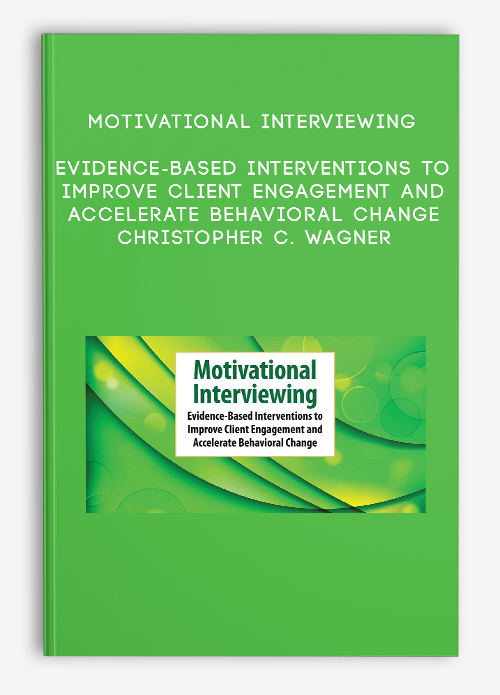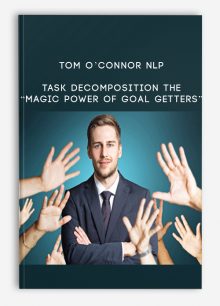Motivational Interviewing: Evidence-Based Interventions to Improve Client Engagement and Accelerate Behavioral Change – Christopher C. Wagner
$219.00 $65.00

Motivational Interviewing: Evidence-Based Interventions to Improve Client Engagement and Accelerate Behavioral Change – Christopher C. Wagner
Sale Page
Archive Page
Get Motivational Interviewing: Evidence-Based Interventions to Improve Client Engagement and Accelerate Behavioral Change – Christopher C. Wagner on Salaedu.com
Description:
Are you frustrated with having the same client sessions over and over? Perhaps you’re watching your clients struggle with addiction, anxiety, or other mental health challenges, and your attempts to empower them to make positive changes in their lives feel like going into battle. You feel like you’re working harder than your client, and you feel like they resist everything.
You can make a significant, positive impact on your clients’ lives with Motivational Interviewing.
Motivational interviewing (MI) has emerged over the past three decades as a leading approach for addressing a core clinical concern – motivation. When mastered, this evidence-based approach is highly effective in motivating positive change.
Better still, motivational interviewing can be used regardless of diagnosis and in conjunction with other treatment approaches.
Chris Wagner, Ph.D., motivational interviewing trainer and author, will teach you the skills you need to know to successfully help these clients. You’ll learn how the MI process works, how to help your clients resolve ambivalence about change, and how to effectively respond to resistance in clients. You’ll leave this seminar confident and with the strategies you need to treat your clients with depression, anxiety disorders, addictive behaviors and other clinical issues.
Escape the pattern of struggling with clients, and instead evoke your clients’ own motivation to change!
Outline:
Motivational Puzzles: Why People Don’t Do What’s Best for Themselves
- Redefine motivation as an interactive state
- Utilize three components of change
- Desire for and fear of change in therapy
- Ambivalence across the stages of change
- How ambivalence becomes resistance
- The spirit of MI
Core MI Processes to Cultivate Change
- Engaging: The Relational Foundation
- Partnership – the core relationship
- “Dancing” vs. “wrestling”
- Avoid the “expert” role
- Foster client autonomy
- The core skills of MI
- Focusing: The Strategic Decision
- Match your agenda to the client’s goals & priorities
- Help clients develop a direction for change
- Guiding vs. directing or following
- Help clients find freedom
- How to prioritize multiple presenting issues & concerns
- Evoking: Preparation for Change
- The key ingredient of MI
- Preparatory vs. mobilizing change talk
- Elicit importance, confidence & readiness for change
- Acceptance & empathy as tools for eliciting change talk
- Help clients align values and behavior
- Aid clients in leveraging strengths
- Build momentum toward change
- Planning: Commitment to Change
- How and when to plan
- Information exchange to aid in plan development
- The “Dos” and “Don’ts” of giving advice
MI Tools for Anxiety: Inspire Clients to Engage in Previously Avoided Behaviors
- MI strategies to strengthen collaboration
- How to challenge “the way I’ve always done it” thinking
- Interventions to break familiar, anxiety-inducing patterns
- Combine MI with cognitive behavioral therapy (CBT)
MI & Depression: Boost Your Clients’ Resilience, Self-Worth & Self-Efficacy
- Overcoming ambivalence in depression
- Friends & family: Help clients learn to filter well-intentioned advice
- Accept, acknowledge, empathize
- Help clients reframe therapeutic tasks
- MI & crisis intervention
Substance Use and Addictive Behaviors: MI Strategies to Catalyze Change and Reach Recovery Goals
- What makes life worth living?
- Avoid pushback: Emphasizing choice
- Substance use
- Other addictive/compulsive behaviors
- Using MI in conjunction with the 12 steps
Research Limitations and Potential Risks
NLP online course
So what is NLP?
Firstly, NLP stands for Neuro-Linguistic Programming. Secondly neuro refers to your neurology;
Thirdly linguistic refers to language however, programming refers to how that neural language functions.
As a result,In other words, learning NLP is like learning the language of your own mind!
Moreover, NLP is the study of excellent communication–both with yourself, and with others.
It was developed by modeling excellent communicators and therapists who got results with their clients.
NLP is a set of tools and techniques, but it is so much more than that.
In conclusion, It is an attitude and a methodology of knowing how to achieve your goals and get results.
1 review for Motivational Interviewing: Evidence-Based Interventions to Improve Client Engagement and Accelerate Behavioral Change – Christopher C. Wagner
Add a review Cancel reply
Related products
HYPNOSIS - NLP Courses
HYPNOSIS - NLP Courses
HYPNOSIS - NLP Courses
Tom O’Connor NLP – Task Decomposition The “Magic Power of Goal Getters”
HYPNOSIS - NLP Courses
HYPNOSIS - NLP Courses
Niraj Naik – Renew Your Body & Reprogram Your Reality With SOMA Breathwork










king –
“We encourage customers to contact Customer Service and think twice before making payment. All course contents will be similar to what is from the author.”
Thank you!